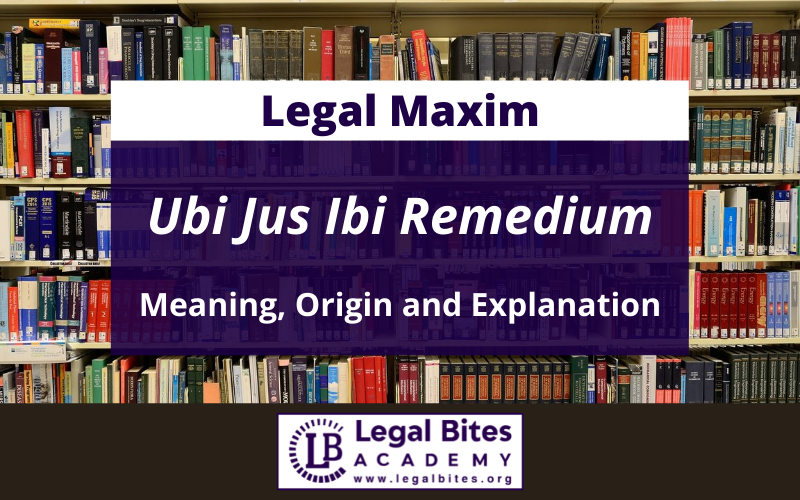Ubi Jus Ibi Remedium: Origin, Meaning and Explanation
This article titled ‘Ubi Jus Ibi Remedium: Origin, Meaning and Explanation’ is written by Sahajpreet Bhusari and discusses the legal maxim of Ubi Jus Ibi Remedium. I. Origin and Meaning Ubi Jus Ibi Remedium is a legal term of Latin origin. It means, ‘where there is a wrong, there is a remedy’[1]. II. Explanation According to the maxim, if… Read More »
;
This article titled ‘Ubi Jus Ibi Remedium: Origin, Meaning and Explanation’ is written by Sahajpreet Bhusari and discusses the legal maxim of Ubi Jus Ibi Remedium. I. Origin and Meaning Ubi Jus Ibi Remedium is a legal term of Latin origin. It means, ‘where there is a wrong, there is a remedy’[1]. II. Explanation According to the maxim, if a wrong is committed, the law will offer a remedy. In plain terms, the law lays out a course of action for every wrongdoing. It may also...
This article titled ‘Ubi Jus Ibi Remedium: Origin, Meaning and Explanation’ is written by Sahajpreet Bhusari and discusses the legal maxim of Ubi Jus Ibi Remedium.
I. Origin and Meaning
Ubi Jus Ibi Remedium is a legal term of Latin origin. It means, ‘where there is a wrong, there is a remedy’[1].
II. Explanation
According to the maxim, if a wrong is committed, the law will offer a remedy. In plain terms, the law lays out a course of action for every wrongdoing. It may also be defined as the notion that no injustice should go unpunished if it can be rectified via the use of the legal system.
Wrong activities, according to the law, are those that are not mandated by moral principles or are banned by law. When a person’s right is violated, the law provides a remedy in the form of legal action. As a result, this right to a remedy also includes the right to take action. The maxim also emphasises that the individual whose right has been infringed has the right to seek judicial redress for the infringement.
The tort law is derived from the Latin phrase Ubi jus ibi remedium. In the maxim, the phrase jus refers to the legal power to do or demand anything, but the term remedium refers to a person’s right to seek redress in court for harm done to the person. It should be highlighted that the maxim is only applicable to circumstances in which a person has been subjected to a legal wrong, not to moral or political wrongs.
III. Application
The maxim applies when:
- a legal right exists,
- a wrongful act has been undertaken that violates the person’s legal rights, and
- the person’s legal rights have been violated.
- The court has failed to grant adequate redress.
IV. Illustration
Due to the Municipal Corporation’s irresponsibility, a cloak tower collapsed, hurting a number of individuals. People who have been wounded have the right to seek a reasonable remedy in a court of law.
V. Case Laws
The Supreme Court declared in Sardar Amarjit Singh Kalra v. Promod Gupta & Ors.[2] that the maxim ‘Ubi jus ibi remedium’ is acknowledged as a core tenet of the idea or concept of law, and that courts must safeguard and defend the rights of parties rather than refuse them the remedy.
The petitioner in Bhim Singh v. State of Jammu and Kashmir[3] was a member of the Jammu and Kashmir legislative assembly. He was wrongly arrested by a police officer on his approach to the legislative session, and he was barred from attending.
He was not brought before the magistrate in a timely manner, despite the fact that he had a legal right to be present at the hearing. His constitutional right to freedom of expression under Article 21 was also breached. The Supreme Court found the defendants to be at fault and granted the petitioner Rs.50,000 in damages for the violation of his basic right.
References
[1] Ubi Jus Ibi Remedium, Available Here.
[2] Appeal (civil) 1027-1028 of 1992.
[3] AIR 1986 SC 494.


